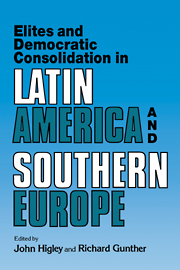Book contents
- Frontmatter
- Contents
- About the contributors
- Preface
- 1 Introduction: elite transformations and democratic regimes
- 2 Spain: the very model of the modern elite settlement
- 3 Elite settlements and democratic consolidation: Colombia, Costa Rica, and Venezuela
- 4 Mexico's elite settlement: conjuncture and consequences
- 5 Elite unification and democratic consolidation in Italy: a historical overview
- 6 The role of civil–military pacts in elite settlements and elite convergence: democratic consolidation in Uruguay
- 7 Patterns of elite negotiation and confrontation in Argentina and Chile
- 8 Elites in an unconsolidated democracy: Peru during the 1980s
- 9 Brazil's political transition
- 10 Redefining the Portuguese transition to democracy
- 11 The Dominican case
- 12 Elites and democratic consolidation in Latin America and Southern Europe: an overview
- Index
6 - The role of civil–military pacts in elite settlements and elite convergence: democratic consolidation in Uruguay
Published online by Cambridge University Press: 05 June 2012
- Frontmatter
- Contents
- About the contributors
- Preface
- 1 Introduction: elite transformations and democratic regimes
- 2 Spain: the very model of the modern elite settlement
- 3 Elite settlements and democratic consolidation: Colombia, Costa Rica, and Venezuela
- 4 Mexico's elite settlement: conjuncture and consequences
- 5 Elite unification and democratic consolidation in Italy: a historical overview
- 6 The role of civil–military pacts in elite settlements and elite convergence: democratic consolidation in Uruguay
- 7 Patterns of elite negotiation and confrontation in Argentina and Chile
- 8 Elites in an unconsolidated democracy: Peru during the 1980s
- 9 Brazil's political transition
- 10 Redefining the Portuguese transition to democracy
- 11 The Dominican case
- 12 Elites and democratic consolidation in Latin America and Southern Europe: an overview
- Index
Summary
During the 1980s, one Latin American military regime after another underwent a transition to democracy, although with widely varying results in terms of the restoration of civilian control over governments. This chapter focuses on one country in which a uniquely explicit effort was made to negotiate a military withdrawal to the barracks. Uruguay's Naval Club Accord of August 1984 represented the successful culmination of a series of such efforts. It did not represent a full-scale elite settlement so much as a shift in the key elites disposed to cooperate in democratic politics. The pact came at the expense of one of the major elites in the country (the leaders of the Blanco party), who were excluded. Thus the process by which democracy has been subsequently (re-) consolidated involved the reincorporation of the Blanco elite by a process of convergence.
Democracy emerged in Uruguay in the first quarter of this century as a result of a slow elite convergence between two established party elites, the Blancos and the Colorados (Gillespie and Gonzalez 1989). By the 1970s, however, the two traditional party elites no longer were the only important elites in the country's politics. Military commanders had risen to a position of autonomy and influence that made them crucial actors. Likewise, the growth of parties on the left made their leaders influential. What was required for democracy to be reequilibrated was thus either a comprehensive elite settlement or a new process of convergence that would bring all four elites into fundamental consensus regarding democratic institutions and the rules of the game.
- Type
- Chapter
- Information
- Publisher: Cambridge University PressPrint publication year: 1991
- 1
- Cited by



